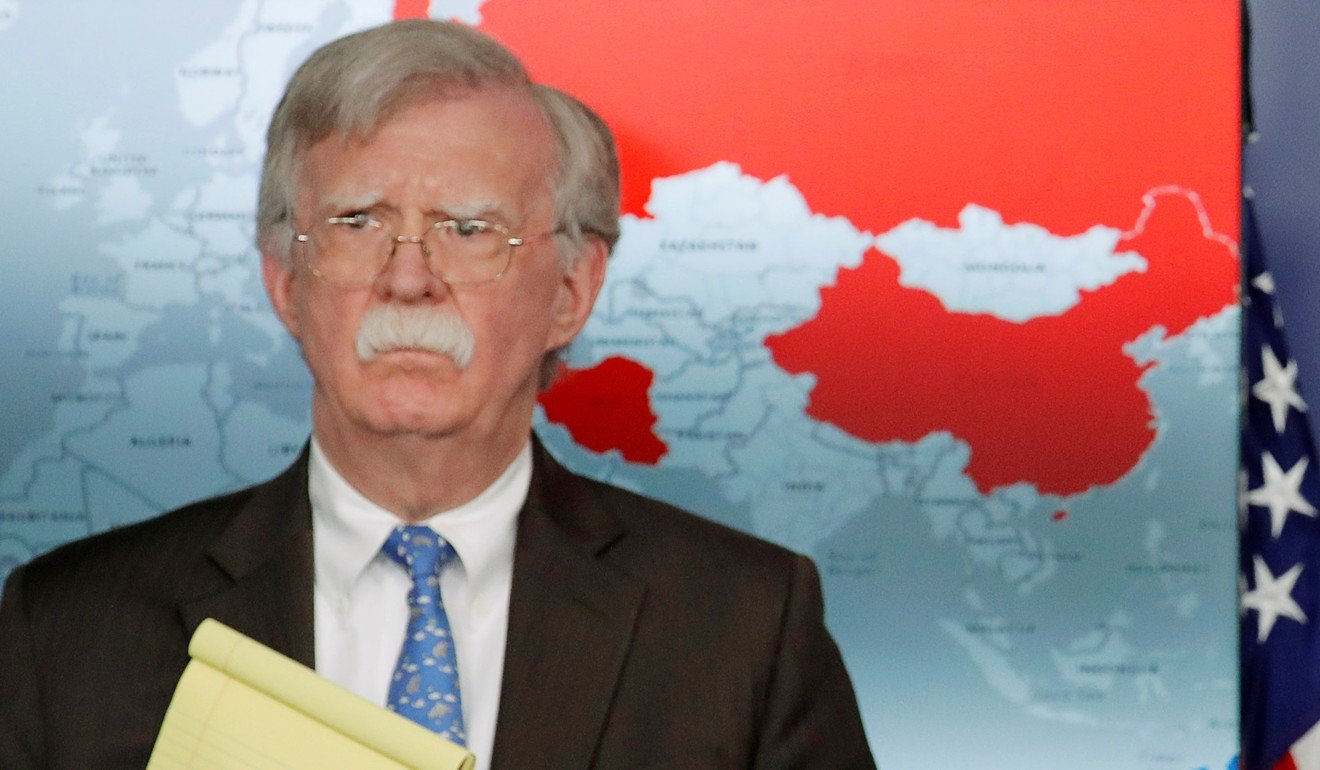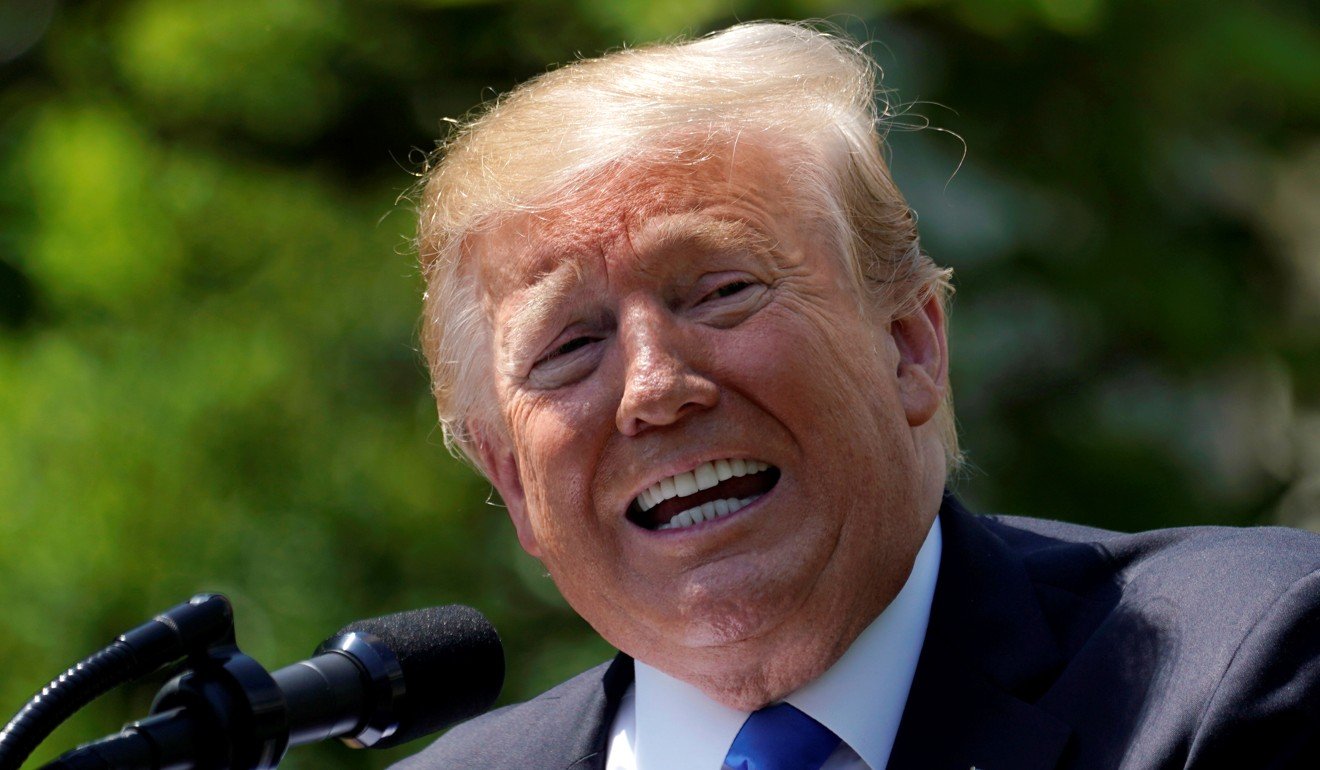
FBI director Christopher Wray making his mark as a loud and insistent China critic
- Global Times, a Chinese Communist Party outlet, fires back after Wray says China tries to ‘steal its way up the economic ladder’
- The remarks are only the latest in a long string of criticisms by Wray, a growing leader in US security community
“Vulgar”, “arrogant”, “mentally challenged”, a “low-life”. Ask Chinese state media for an assessment of the US Federal Bureau of Investigation’s director Christopher Wray, and the response will be less than flattering.
Wray’s scathing critique last week of what he called China’s attempts to “steal its way up the economic ladder” at the United States’ expense – “stealing innovation in any way it can, from a wide array of businesses, universities and organisations” – quickly drew fire from nationalist voices across the Pacific.
An editorial by the reliably provocative Global Times, which is published by Chinese Communist Party mouthpiece People’s Daily, led the charge.
Wray’s accusation, made at the Council on Foreign Relations (CFR) in Washington on April 26, displayed an “undisguised contempt for the whole of Chinese society” and threatened to lead US understanding of China “into the gutter”, the editorial said.
“People like Wray emanate the kind of vulgarity shown by history’s career low-lifes. That vulgarity floods the US administration today.”
The FBI director now joins a growing list of figures in US President Donald Trump’s orbit to draw attacks from Chinese state media, as Washington takes a harsher stance towards Beijing amid a rapid downturn of relations.
However, unlike divisive characters like Trump’s former chief strategist Steve Bannon, National Security Adviser John Bolton, economic adviser Peter Navarro and even Trump himself, Wray could prove a tough target to discredit, given his bipartisan support and standing within the national security community.
The FBI did not respond to South China Morning Post requests for comment or an interview with Wray. But former FBI agents call Wray a “principled” figure not easily swayed by political interference. If he was taking China to task, they said, he was doing it on the evidence alone.
China ‘determined to steal up economic ladder’, FBI chief says
Jeff Lanza, a former FBI official with experience on economic espionage cases relating to China, said that Wray’s statements were “more likely based on actual FBI investigations and cases – some of them have borne out in the news as well – [and] indictments that have been made public regarding Chinese attempts to steal information”.
Wray’s CFR comments were only the latest in a series of blistering public remarks he has made about China since the 52-year-old native New Yorker took over the reins at the FBI in August 2017.
Having served as an assistant attorney general in the George W. Bush administration, he was working as a litigation partner for the King & Spalding corporate law firm when Trump nominated him to replace James Comey, whom Trump had fired in May. (Comey had been leading an investigation into whether Trump’s campaign colluded with Russia in meddling with the 2016 presidential election.)

It didn’t take Wray long to find a place of note among the administration’s China critics. Six months into his tenure, he accused Beijing of increasing its use of “non-traditional collectors” – such as professors, scientists and students – for its intelligence gathering.
“One of the things we’re trying to do is view the China threat as not just a whole-of-government threat but a whole-of-society threat on their end, and I think it’s going to take a whole-of-society response by us,” Wray testified at a Senate hearing in February 2018.
Eight months later at another hearing, Wray escalated his rhetoric by declaring China “the broadest, most complicated, most long-term” counter-intelligence threat confronting the US – surpassing even Russia, whose interference in the 2016 election dominated headlines for more than two years and continues to roil the country.
To Wray’s way of thinking, though, “Russia is in many ways fighting to stay relevant after the fall of the Soviet Union. They’re fighting today’s fight.
“China is fighting tomorrow’s fight, and the day after tomorrow, and the day after that,” he stressed. “And it affects every sector of our economy, every state in the country, and just about every aspect of what we hold dear.”
FBI chief says China poses bigger US security threat than Russia
Under Wray’s watch, the FBI has heightened scrutiny of Chinese academics visiting the US – a notable departure from the four decades since the two countries normalised relations, during which the US has generally welcomed Chinese scholars and researchers.
The FBI initiated a counter-intelligence operation to bar Chinese academics suspected of links to Chinese intelligence agencies from the US.
Nearly 30 Chinese professors have had their US visas cancelled or put on administrative review in the past year, according to report last month by The New York Times.
To some former FBI officials, Wray is simply taking necessary steps. Closer scrutiny of Chinese espionage activities was long overdue, according to FBI veteran James Wedick, who served in the bureau from 1969 to 2004.
Following the September 11 attacks, he said, the FBI concentrated resources on counterterrorism programmes, creating a “void” that China took advantage of.
Wray, Wedik said, was “just saying this is an area we need to be conscious about”.
“The pendulum has to swing back. We took agents away from [China-related] programmes.”
US and China must stop blocking academic visas, scholars say
While the Global Times thundered at Wray, Beijing has so far officially refrained from directly hitting back.
Asked at a Chinese foreign ministry press briefing in October about Wray’s assessment of the threat China posed, spokesman Lu Kang only gave a vague statement urging the US to make more comments that “serve to promote US-China relations, but not the opposite”.
And Wray’s most recent remarks also came just ahead of the latest round of trade talks in Beijing that both sides have been characterising as constructive and productive.
Even so, Wray has taken the helm at the FBI at a time when US hawkishness towards China is arguably at its fiercest – and playing out across a “whole-of-government” landscape – so it is not surprising he has been accused of trying to sabotage US-China relations.
In the mind of Global Times’ Saturday editorial, Wray represents senior elements of the Trump administration who have fallen prey to “Bannon-isation”, an affliction presenting itself with symptoms of heightened self-importance, intellectual ossification and mental deficiency.
Yet Wray’s track record in his capacity of both director of the FBI and previous governmental positions paints a picture of a civil servant who has made resisting the politicisation of US national security policy a priority.
To former FBI agents like Wedick, Wray is a principled and apolitical figure who “is not in bed with the hawks at all”.
Praised by Trump for his “impeccable credentials”, Wray and his nominations were welcomed by both Democrats and Republicans, given that the president had been considering ex-lawmakers – including former senator Joe Lieberman and former Oklahoma governor Frank Keating – for a role traditionally filled by non-politicians from legal and law enforcement backgrounds.
“I will never allow the FBI’s work to be driven by anything other than the facts, the law and the impartial pursuit of justice,” Wray told senators during his nomination hearing. “Period. Full stop.”
China and US focus on progress before fresh round of trade talks
That commitment to ensuring that the agency remained sheltered from political winds was all the more pressing given “what happened under our previous director”, said Lanza, referring to Comey’s handling of a probe into then-secretary of state Hillary Clinton’s use of a private email server.
“That’s not to say that our current president won’t put political pressure on someone in [Wray’s] position, I just don’t think that he would respond in this way,” Lanza said.
Indeed, defending his agency has at times placed Wray at odds with Trump, who in late 2017 said that Comey had left the agency’s reputation “in tatters”.
Days later, asked at a congressional hearing about Trump’s remarks, Wray said that the FBI he saw was “tens of thousands of brave men and women who are working as hard as they can to keep people that they will never know safe from harm”.

Apparent tension between Wray and Trump deepened last year when Wray reportedly threatened to resign over pressure from then-attorney general Jeff Sessions to fire the FBI’s deputy director Andrew McCabe, a colleague of Comey’s and a long-time target of Trump’s ire.
Asked by NBC News to confirm the threat, Wray said, “I’m a low-key, understated guy, but that should not be mistaken for what my spine is made out of. Let’s just leave it at that.”
To Wedick, such responses show that “Wray has a blue line, he tells the administration this is what my position is, and he’s going to stick to it”.
“And I think that has caused him to gain some respect that we lost under Comey and McCabe and what have you.”
FBI chief says Chinese operatives have infiltrated scores of ‘naive’ US universities
Wray has also appeared reluctant to lump together every complaint from Congress. For example, his position on China’s Confucius Institute – Chinese language-learning centres outside of China operating under the auspices of the Ministry of Education – suggests efforts to distinguish between Beijing’s “soft power” initiatives and more serious security threats.
The institutes have drawn US scrutiny for operating with what critics contend is a lack of oversight by the colleges and universities that host them.
“The Confucius Institutes are something that we view as part of a sort of soft-power strategy that the Chinese government has, and certainly something we’re concerned about,” Wray said at his Council on Foreign Relations talk, which he opened by discussing Beijing’s cyberefforts to steal American critical technologies.
“In many ways, a lot of the things that I talked about in my opening comments are things we’re more concerned about even than the Confucius Institutes, though.”
His remarks reflected the findings of a recent paper commissioned for Congress by the Government Accountability Office, investigating agreements between American universities and Confucius Institutes.
The February report acknowledged that the institutes were a soft-power exercise by Beijing, but did not find any evidence that these arrangements constituted any kind of national security threat.

Despite accusing China of posing a “whole-of-society” threat to the US, Wray has drawn a line between the Chinese government and the Chinese people.
“China’s goal, simply put, is to replace the US as the world’s leading superpower – and they’re breaking the law to get there,” he said in December, announcing the indictment of two Chinese hackers associated with China’s Ministry of State Security, the country’s main civilian spy agency.
FBI counter-intelligence official warns of Chinese espionage
“Now, we’re not talking about the Chinese people as a whole,” he stressed. “We’re focused on state-sponsored actors engaged in illegal behaviour.”
But it could be difficult for most mainland Chinese to get a more complete picture of Wray beyond the damning profile drawn by state media – even those digital users who can manage to circumvent the country’s notorious Great Firewall.
Wray, a key government official in maintaining the nation’s cybersecurity, is determined to remain absent from major social media platforms, telling an amused CFR audience that he is not on Facebook or Twitter.
Would he consider joining the networks after his tenure at the FBI ends?
“Nope.”
Additional reporting by Robert Delaney


